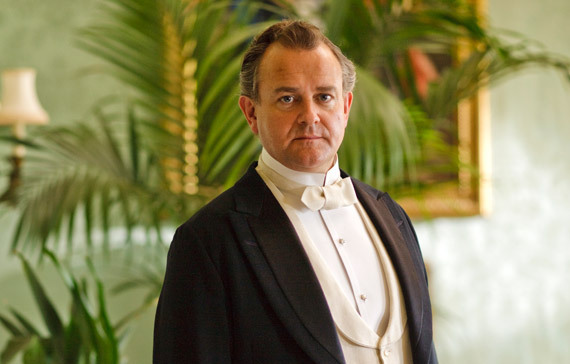In case you haven’t been paying attention, the Downton Abbey fans are outraged. The third season of the acclaimed series ended with the death of main character, Matthew Crawley, only a few episodes after the death of another fan favorite, Lady Sybil. This has been the season of the “Free Bates” campaign, endless Facebook chatter and even a political cartoon featuring a PBS representative holding a gun to the script and threatening us to donate or he’ll kill off another character. On one hand, this amuses me. I like big period pieces, I cannot lie. And all the outcry means there’s enough of us watching to make Downton Abbey almost a fetish and its creator, Julian Fellowes, our sugar daddy.
But for me, the romance is officially over. The problem with love affairs, much like a miniseries, is that they’re meant to be brief and intense, but once they go on too long, the entire experience is ruined. In the case of Downton, Fellowes wooed us with diamonds, allowed us to fall in love, and then tried taking us to Red Lobster for our first anniversary. This was a bad investment and not because he keeps killing off our favorite characters, but because his show is terrible and we’re still embarrassing ourselves by being such cheap dates.
It wasn’t always this way. The first season tricked us into bed by presenting the plot of a well-crafted movie spread out over seven episodes. The heir to Downton Abbey dies in the sinking of the Titanic and none of the Grantham daughters can legally inherit the estate. The premise was specific and sustainable. Meanwhile, servants sabotaged each other and rivalries grew between different family members. But everything was centered on the questions, “Who will inherit the estate?” and “What does that mean for the rest of us?”
The most notable storyline of the first season was its scandal. Lady Mary, the essential Edwardian cock tease, gets seduced by a Turkish diplomat who dies mid-coitus! It’s shocking and almost too ridiculous to take seriously, but because of the execution, it’s a highlight of the entire series. There is no neat and tidy conclusion and the consequences continue to build. Not only is Mary traumatized by the death, but she has to cover it up to protect her reputation. It increases her need to wed the new heir, Matthew, later provides an opportunity for brooding sister Edith to expose the scandal, an act that leads Mary to sabotage Edith’s romance as well.
I was stricken! While my husband was alone in bed, crying himself to sleep, I remained glued to my TV set, writing fan fiction about Lord Grantham and daydreaming about Maggie Smith verbally slapping people. I assumed the series could only get better and told my husband if he could wait patiently through this obsession, things would return normal between us.
Unfortunately, some quick flings try to become long-term commitments when they shouldn’t. Fellowes had the right pick-up lines, he dazzled us with witty banter and exciting dramatics. But once he had us, he didn’t know what to do with us. He created an amazing first season but obviously didn’t know what to do next.
Once the series entered World War I, it had an identity crisis. It couldn’t decide if it was All Quiet on the Western Front or General Hospital, all while desperately clinging to its Upstairs, Downstairs roots. One thing for certain, it’s carefully intertwined story arch was replaced with a series of melodramatic events that solved themselves a little too easily. Why does some random deformed solider show up and claim to be the previous dead heir if he’s going to just disappear by the end of the episode? And worse, why doesn’t Lord Grantham ever take off his shirt?
The Mary-Matthew romance, which carries most of the series, turns absurd. Matthew keeps going and returning from war, presents a new fiancé, and then gets injured in combat. He returns back to Downton paralyzed and impotent with the boring Lavinia by his side. Meanwhile, the newly engaged Mary watches from afar, obviously still in love with him. This was a lovely dark twist: even if Mary and Matthew do resume their romance, he can’t provide children and we all know at this point, Mary isn’t happy at the picnic unless she can have her hot dog.
But no, Matthew’s legs and penis magically start working again and then Lavinia conveniently dies of Spanish Influenza right afterwards. This was plain bad writing. I felt betrayed, Mr. Fellowes.
A few other disappointing things happened as well. The evil wife of the saintly Mr. Bates shows up and causes problems for no apparent reason. Lord Grantham almost has an affair but doesn’t. Predictably, Lady Sybil marries the chauffeur without getting disowned. And Evil Thomas gets his job back because everyone forgot that he was stealing from the liquor cabinets last season. With most of the loose ends neatly tied up, it seemed Fellowes was obviously aware of his failures and tried to clean his own slate.
So, the honeymoon period was over. But the third season gave me the impression it was going back to the basics and would rekindle my lost affection. It did not. Shirley MacLaine briefly joined the cast for no other reason than to make the prophetic statement, “The world has changed. These houses were built for another age…,” which bluntly summed up what the first season so delicately established. Even with Downton’s estate on the edge of financial ruin, the ghost of Lavinia serendipitously drops another fortune on Matthew’s lap to save the day. With the main conflict resolved, the rest of the season resorts to killing off main characters in order to keep our interest.
Why are we staying faithful to this? I find it most disturbing that with the dumb-downed plot lines, even the characters have become rigid and predictable. Aside from Mary becoming more humble, very few have actually changed. O’Brien and Thomas both remain the villainous servants, except that instead of fighting against Bates, they’re now fighting against each other. In general, the men are overwhelmingly altruistic and the women tend to have more character flaws and suffer harsher consequences. For instance, Evil Thomas is exposed as a practicing homosexual (quiet illegal in those days) and though he risks being arrested, Lord Grantham unrealistically protects him. However, the maid Ethel has a baby out of wedlock and the house abandons her, which eventually puts her as a prostitute and her only happy ending is to be forever separated from her child.
Lady Sybil is the best example of how this show fails its characters. The idealistic teenybooper of the Crawler sisters demanded to take cooking lessons from the kitchen staff, turned a dress into a pair of bloomers, secretly attended protests and became a war nurse. Of course we loved her – she was rebellious. But apparently, Fellowes didn’t know what to do with her after that. Instead, she stumbled into the clichéd relationship with the chauffeur. So our progressive girl progressively becomes a working class wife? Not only is it a feminism-fail, but the show avoids any harsh realities associated with this. She doesn’t get disowned. Her new husband, Tom Branston, is thankfully one of the many overly good guys. This was the time period where it was still socially acceptable to get drunk and slap your wife around. Common sense would say that a rich girl will not adjust well to lower-class life without a few problems, but then both characters are stereotypes. Without any valid plot, Sybil died in childbirth. But at that point, I was so bored with her character, I didn’t care. (Let’s be honest, Sybil did have the complexity of a block of cheddar.)
Then we have Mr. Bates, one large limping victim’s complex. He’s a disabled war veteran, an ideal servant, and a pacifist. So, technically he’s a boring character and for some reason, Fellowes has a tremendous man-crush on him. All of Bates’ plot consists of some malicious individual trying to do him harm. The Mrs. Bates subplot frolics down the long staircase of absurdity – she is evil for the sake of being evil and has no apparent motives other than do her husband harm at any cost, because Bates’ purpose is simply to be victimized. By season three, he gets his own private Shawshank Redemption, has reached full martyr status and unfortunately, the predictable outcome is stretched out a lot longer than my patience.
Like many characters post-season one, Bates doesn’t actually do anything. He simply reacts to what is being done to him without ever changing. This is similar to Sybil, who seemed to make choices, but simply reacted to the forced romance plot placed upon her. But then, the series as a whole quit being about individual characters and more about random events to complicate their lives. The major difference: like most men in the series, Bates’ passive gentility was rewarded by his rescue from jail while Sybil’s fiery passion was rewarded with death in childbirth.
For me, the culture phenomenon of Downton Abbey is over, as is this terrible system of rewarding the obvious over the extraordinary. No fancy pick-up lines could ever take me back to the beginning. Meanwhile in the real life, unfair inheritance laws are still a concern for some of us, rivalries and debilitating don’t disappear when its convenient.
That’s why I’ve moved on … to Parade’s End.
httpv://www.youtube.com/watch?v=eTDCj9-spF8
———-
 Got a question? Email jonathandefenestrates@gmail.com.
Got a question? Email jonathandefenestrates@gmail.com.



